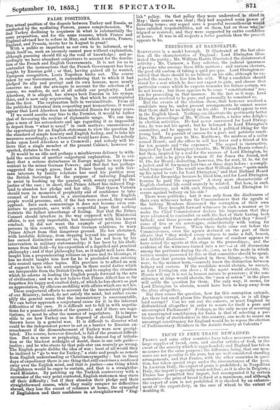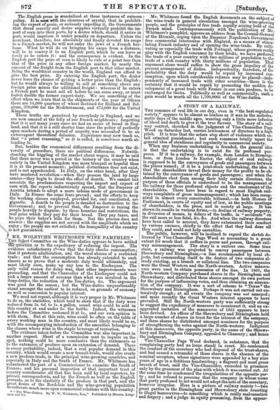TRUST IN FREE TRADE REWARDED.
FRANCE and some other countries have taken measures to secure large supplies of bread, corn, and similar articles of food, in the event of the scarcity which is apprehended ; and England has taken measures for the same purpose ; the difference being, that our mea- sures are not peculiar to the year, but are well-considered standing arrangements, and that France, with the other countries in ques- tion, has taken special steps under the circumstances of the year. In Austrian Italy, the export of grain is prohibited; in Neapolitan Italy, the import is specially rendered free ; as it is also in Belgium ; France has permitted free import, but accompanied it by certain restraints—the price of bread is fixed at a maximum, and although the export of corn is not prohibited it is checked by an enhance- ment of the export-duty, in the case of wheat to the extent of doubling it.
The English press is scandalized at these instances of ruinous policy. It is as with the clearness of crystal, that in prohibit- ing the export of grain, or seriously impeding it, the Governments that dread scarcity and desire supplies virtually prohibit the im- port of corn into their ports, by a decree whioh, should it arrive in port, would imprison it under penalty on departure. Unless the merchant, therefore, has absolutely and finally devoted his cargo to a French market, he will not enter the jaws of a French har- bour. What he will do on bringing his cargo from a distance, will be to convey it to an English port, which he can leave as freely as he enters it : and the consequence is evident. In the English port the price of corn is likely to rule at a point less than that of the price in any other foreign market, by nearly the amount of the freight from the English port to that other market. Being the wealthiest country in the world, England can afford to give the best price. By entering the English port, the dealer never loses the chance of getting a better price than the English ; but he would always be willing to sell at something above any foreign price minus the additional freight : whereas if he enters a French port he must sell all before he can come away, or must forfeit double the former export-duty. We see something of the effect when we learn that in the shipments of the year at Odessa there are 14,000 quarters of wheat destined for Holland and Bel- gium, 370,000 for the Mediterranean, and 475,000 for the United Kingdom. These truths are perceived by everybody in England, and we are now amazed at the folly of our French neighbours ; forgetting that it is not many years since we had an assize of bread in Eng- land, and that it is a still shorter time since the policy of perfectly open markets during a period of scareity.was accounted to be an extravagant theoretical delusion. Experience may now teach us, that "a priori reasoning," as it is called, is sometimes worth at- tending to. But, besides the economical differences resulting from the di- versity of procedure, there are political differences. Notwith- standing the higgling of the market about wages it may be said that there never was a period in the history of the country when society in the -United Kingdom was more tranquil or hopeful than it is at the present moment; political disturbance does not exist, and is not apprehended. In Italy, on the other hand, after they have mastered revolution—when they possess the land by large armies—they begin to dread the effect of dearth. We cannot but associate the proclamations respecting the import and export of corn with the reports industriously spread, that the Emperor of Austria intends to adopt a more urbane mode of government in Italy. In France the same fears prevail; and the efforts to keep the working classes employed, provided for, and conciliated, are gigantic. A dearth to the people is dreaded as destruction to the Government ; and to prevent that, the Emperor is taxing the people heavily to disguise, by these bounties and restrictions, the real price which they pay for their bread. They pay taxes, and he pays their baker's bills for them. But the process does not answer : the supplies are not served with the amplitude which we enjoy; the people are not satisfied; the tranquillity of the country is not guaranteed.



























 Previous page
Previous page